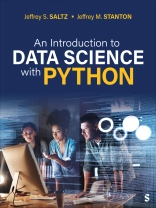An Introduction to Data Science with Python by Jeffrey S. Saltz and Jeffery M. Stanton provides readers who are new to Python and data science with a step-by-step walkthrough of the tools and techniques used to analyze data and generate predictive models. After introducing the basic concepts of data science, the book builds on these foundations to explain data science techniques using Python-based Jupyter Notebooks. The techniques include making tables and data frames, computing statistics, managing data, creating data visualizations, and building machine learning models. Each chapter breaks down the process into simple steps and components so students with no more than a high school algebra background will still find the concepts and code intelligible. Explanations are reinforced with linked practice questions throughout to check reader understanding. The book also covers advanced topics such as neural networks and deep learning, the basis of many recent and startling advances in machine learning and artificial intelligence. With their trademark humor and clear explanations, Saltz and Stanton provide a gentle introduction to this powerful data science tool.
Included with this title:
LMS Cartridge: Import this title’s instructor resources into your school’s learning management system (LMS) and save time. Don′t use an LMS? You can still access all of the same online resources for this title via the password-protected Instructor Resource Site.
Innehållsförteckning
Introduction – Data Science, Many Skills
Chapter 1 – Begin at the Beginning With Python
Chapter 2 – Rows and Columns
Chapter 3 – Data Munging
Chapter 4 – What’s My Function?
Chapter 5 – Beer, Farms, Peas, and Statistics
Chapter 6 – Sample in a Jar
Chapter 7 – Storage Wars
Chapter 8 – Pictures vs. Numbers
Chapter 9 – Map Magic
Chapter 10 – Linear Models
Chapter 11 – Classic Classifiers
Chapter 12 – Left Unsupervised
Chapter 13 – Words of Wisdom: Doing Text Analysis
Chapter 14 – In the Shallows of Deep Learning
Om författaren
Jeffrey M. Stanton, Ph.D. is a Professor at Syracuse University in the School of Information Studies. Dr. Stanton’s research focuses on the impacts of machine learning on organizations and individuals. He is the author of Reasoning with Data (2017), an introductory statistics textbook. Stanton has also published many scholarly articles in peer-reviewed behavioral science journals, such as the Journal of Applied Psychology, Personnel Psychology, and Human Performance. His articles also appear in Journal of Computational Science Education, Computers and Security, Communications of the ACM, Computers in Human Behavior, the International Journal of Human-Computer Interaction, Information Technology and People, the Journal of Information Systems Education, the Journal of Digital Information, Surveillance and Society, and Behaviour & Information Technology. He also has published numerous book chapters on data science, privacy, research methods, and program evaluation. Dr. Stanton′s research has been supported through 19 grants and supplements including the National Science Foundation’s CAREER award. Before getting his Ph D, Stanton was a software developer who worked at startup companies in the publishing and professional audio industries. He holds a bachelor′s degree in Computer Science from Dartmouth College, and a master′s and Ph.D. in Psychology from the University of Connecticut.












